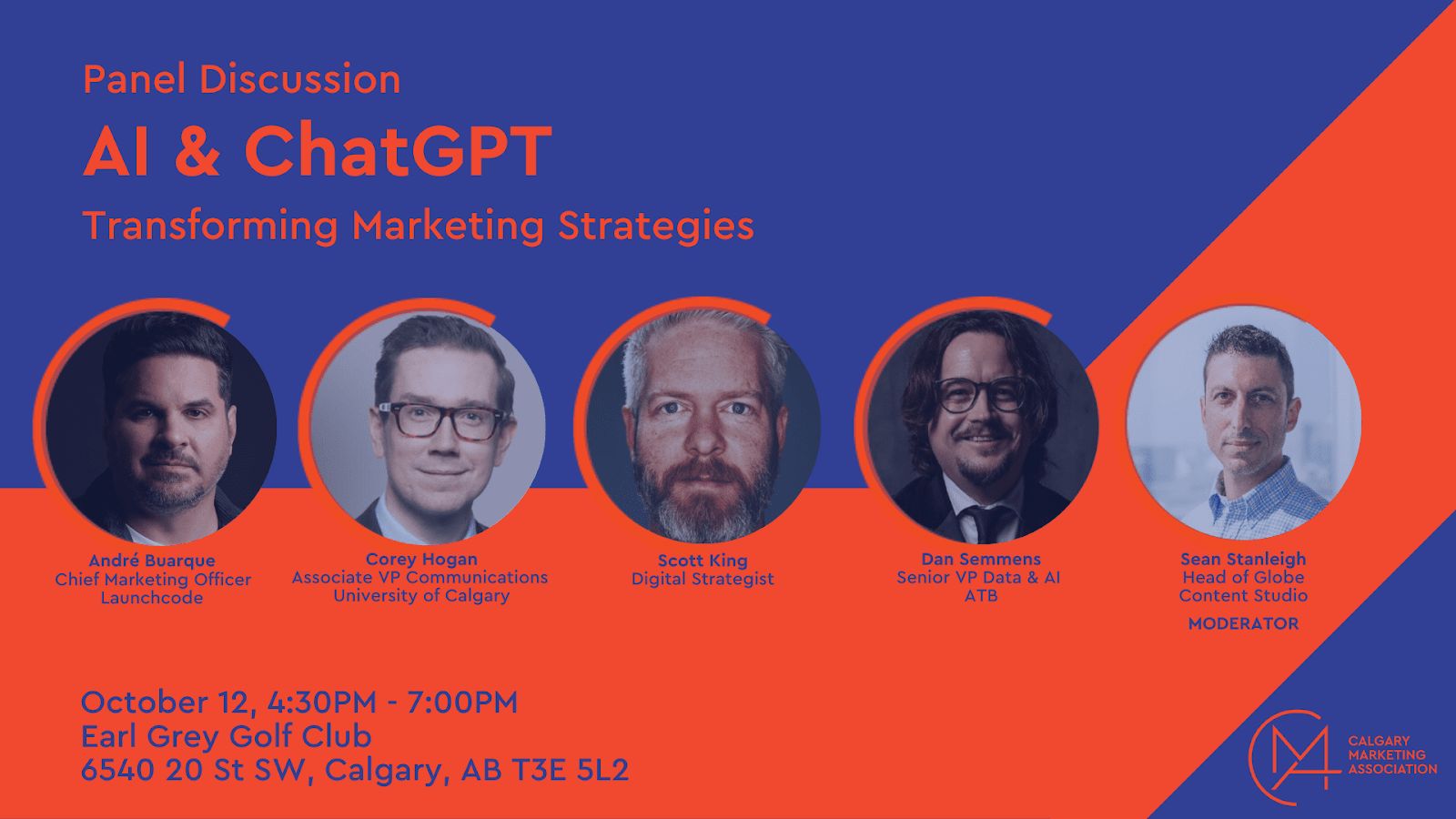AI’s Disruption of Modern Marketing
The rapidly evolving landscape of Artificial Intelligence (AI) is undoubtedly a topic of heated discussion among the marketing industry. I recently had the opportunity to attend a dynamic panel discussion that explored AI's transformative impact on marketing hosted by the Calgary Marketing Association: “AI & Chat GPT: Transforming Marketing Strategies.” From the changing dynamics of customer interactions to novel methods of content creation and brand communication, the marketing playbook has been redefined by AI. The evening featured a star-studded panel of experts that took a deep dive into the nexus of creativity and technology.
Disclaimer: I don’t consider myself an expert in AI, merely a fellow marketer trying to better understand this disruptive technology and what it means for our industry going forward. This blog outlines a few considerations and topics I felt unlocked a fresh perspective on how I understand AI’s transformative impact. Join me as I share the key takeaways from this enlightening discussion offered by these industry experts on blending AI's potential with marketing prowess.
The Transformative Potential of AI in Marketing: Unleashing a New Era of Brand Communication
The world is currently experiencing a deeply disruptive force, one that we have not seen in our lifetime. As marketers, we're no strangers to innovation and change but the introduction of generative AI is set to redefine the contours of our industry. Generative AI tools encompass a wide range of applications, from text and image generation to music and video creation. Central to this AI emergence has been the release of ChatGPT, which uses a series of generative language models capable of creating human-like based text based on the input (or prompts) they receive. This chatbot was developed by OpenAI and is based on a large language model built to handle conversational prompts.
Some of the biggest questions we can ask ourselves are: Where will AI be the most transformative for our business and how can it drive positive change in our organizations? Marketers need to learn how to harness AI's unparalleled capability to synthesize, adapt, and tailor text to resonate deeply with any brand's unique voice and ethos. This transformative potential goes beyond mere automation; it ushers in an era of precision, customization, and relevance that traditional marketing strategies could only aspire to.
With AI-driven tools, brands can generate content that's not only contextually relevant but also emotionally engaging, enhancing the customer's journey with the brand at every touchpoint. Furthermore, the efficiency brought about by AI doesn't just translate to faster content creation. It means smarter content. It implies harnessing vast amounts of data, understanding audience preferences in real-time, and swiftly iterating marketing strategies to stay ahead of ever-evolving consumer demands. In essence, AI's influence in marketing is redefining the very paradigms of brand communication, setting the stage for a future where brands can engage in more authentic, personalized, and impactful conversations with their audiences.
The Evolution of Traditional Marketing Roles
AI has been the catalyst for profound transformations to our professional landscape. When we consider the implications of AI on traditional marketing roles, it's not merely about automation replacing manual tasks; it's redefined the very essence of our productivity as marketing professionals. The idea that writers, traditionally creators of content, might transition primarily into editors, curating and refining AI-generated content, showcases the depth of change on the horizon.
Similarly, designers, who once started with blank canvases, might find themselves refining AI-conceived prototypes or collaborating with algorithms to bring novel visions to life. It underscores a broader trend where professionals aren't just practitioners but also strategists, guiding AI tools with their expertise and intuition.
This shift is emblematic of a broader metamorphosis within the marketing job market. Roles are becoming more fluid, with a heightened emphasis on adaptability, strategic oversight, and collaboration with technology. It's a tectonic shift, one that challenges the existing norms of many professions. Yet, with this change comes the opportunity for innovation, allowing for a fusion of human creativity and machine efficiency. In this new landscape, the professionals who embrace, adapt, and evolve with AI's capabilities will be best positioned to thrive in their respective fields.
Adaptability is Key: Navigating the AI Wave with Agility and Foresight
As these systems grow in complexity and capability, professionals across the marketing industry are faced with a clear choice: adapt or risk obsolescence. Embracing and integrating AI into one's toolkit isn't just about staying relevant; it's about harnessing a new realm of possibilities to drive success.
Historical parallels provide a vivid illustration. Think back to the IT revolution when the advent of computers and the internet transformed how businesses operated. Those who saw it as a mere trend and resisted the shift found themselves outpaced by competitors who recognized the potential of digital tools. Similarly, the industrial revolution brought about massive changes in production and manufacturing. Companies that clung to old methods were overshadowed by those that adapted to mechanized processes.
These historical inflection points underscore a timeless lesson: adaptability isn't just a buzzword; it's a survival trait. In the context of AI, this means continuous learning, a willingness to re-evaluate traditional methods, and a proactive approach to leveraging new technologies. Moreover, it's about cultivating a mindset that views change not as a threat, but as an opportunity to innovate and excel. Marketers who are willing to adapt and effectively use AI will inevitably replace those who can’t.
Striking a Balance Between Innovation and Oversight
The breakneck pace of AI’s development presents many regulatory hurdles and concerns from many in the industry. The biggest regulatory challenge we face is how can regulations keep up? The world of governmental oversight, often characterized by its meticulous deliberation, finds itself racing against a new technology that's accelerating faster than ever. This widening gap isn't just an administrative concern; it holds profound implications for safety, privacy, and ethical standards. Without apt regulations, there's a risk that unchecked AI advancements might inadvertently harm users, compromise data, or even destabilize markets. Addressing this discrepancy demands a proactive, forward-thinking approach from regulatory bodies. They must not only anticipate future AI trajectories but also foster a collaborative dialogue with technologists, ensuring that as AI advances, it does so with the right checks and balances in place.
Marketing in the AI Era: Adapt, Evolve, or Fade Away
As we venture deeper into the era of AI, marketing is facing a profound opportunity for change. The roles that were once staples in traditional marketing are evolving, making way for a future that demands more than just creativity—it requires agility, foresight, and an understanding of intricate AI-driven tools. The potential of AI to usher in a new era of brand communication is truly unparalleled, promising more personalized, effective, and timely interactions with audiences. However, with such transformative power comes the responsibility to navigate the complexities of ownership, ethics, and the overarching power dynamics in AI's development. Balancing the rapid pace of innovation with the necessary oversight is imperative to ensure that this evolution remains beneficial, equitable, and true to the ethical standards of the industry.
As marketers, the choice is clear: adapt and harness the power of AI with both enthusiasm and caution, or risk being left behind. Embrace the change, evolve with it, and shape the future of marketing with informed decisions and proactive strategies.





